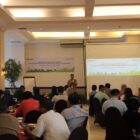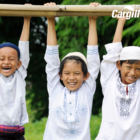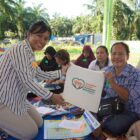It has been four or five months – I have lost count – since the global pandemic hit us in Indonesia. While businesses are slowly recovering, most schools remain closed. For the past few months, I have observed my siblings and colleagues who have young children, trying to balance being a professional, a mother/father and a teacher all at the same time. As a soon-to-be mother, I empathise with the situation.
During this pandemic, the government has directed all schools to close, and many parents now realise how important a role teachers and schools play – something that might’ve been taken for granted previously.
But that doesn’t mean that learning has stopped. In big cities, teachers are conducting classes virtually. Unfortunately, things are a little bit different for teachers and children in remote areas.
Education has always been something close to our hearts at GAR, a legacy left by our founder Eka Tjipta Widjaja. Our company has over 280 schools across Indonesia catering to children around our plantations and surrounding communities, most located in rural areas. Each area has its characteristic and different level of readiness in terms of infrastructure (internet, mobile signal, etc). The learning and teaching process can be challenging in these conditions, but it doesn’t stop our teachers from being creative in reaching their students, because “the show must go on”.
In some areas like Medan and Riau, where the internet connection is considered reliable, our teachers can use internet-based communication tools such as WhatsApp to exchange materials and assignments with students.
But things are very different in Jambi, where some of the students are from the Suku Anak Dalam tribe. They don’t have access to computers, mobile phones or the internet. So to ensure their students are receiving the education that they need, our teachers conduct home visits at least twice a week; from house to house, one student to another.


Every morning Agung Kurniawan, the principle of Eka Tjipta Sapiri elementary school, who lives in Central Kalimantan, wakes up at 5am. He hops onto his motorcycle and drives for an hour to his school. Once Agung reaches the school, together with the other teachers, he starts to plan their home visits for the day. Some students live near the school but a few live far away. Agung and his colleagues need to cross the forest and the river to get to the students’ houses.
“Tired? Of course. I think it’s normal to feel that way. We spend many more hours to travel and to teach in this current situation. But all of it pays off when you know that your student is receiving the education that they need. We are here to prepare them for their future,” said Agung.
Most of the schools in Kalimantan and Papua are still having difficulties in getting internet access. Teachers, community members and my colleagues in the plantation continue to look for creative, yet safe, ways to ensure the learning and teaching process can continue. They try to ensure the students can see their teachers at least twice a week. Either it’s through a home visit or a small study group.
“What gives me the strength to continue to teach despite the challenges that we are facing is the students’ spirit to learn. It’s remarkable. In the beginning, I was worried that they won’t be as committed as they normally would be in school, but the response has been surprising. Despite the reduced supervision, they still submit their assignments regularly,” said Tina, Elementary school teacher from SD Eka Tjipta Cantung, South Kalimantan.


To make this work, all parties must play their part in “the new normal”. Whenever needed, our company school bus is ready to take the teachers to make their rounds from home to home, and our regional offices are open to be used as a meeting place, of course with strict health and safety guidelines in place. Furthermore, teachers who are using their own vehicles for visits can get their gas expenses reimbursed using the BOS (School Operational Assistance Programme) fund from the government.
Personally, I am very inspired by our teachers and children from the schools in our Sumatra, Kalimantan and Papua estates. Despite the challenges they face, they are able to make the best out of the situation. We often take things for granted, until we lose them. In this case, we often understate the importance of teachers in our children’s life. What I have learnt is that being a teacher is hard work, and requires dedication. I am sure that many of us – parents, teachers, children alike – cannot wait for schools to reopen.
To find out more about our exceptional teachers and their experience in this pandemic, click here.
Original post by GAR
https://www.goldenagri.com.sg/teachers-going-the-extra-mile-during-covid-19/



